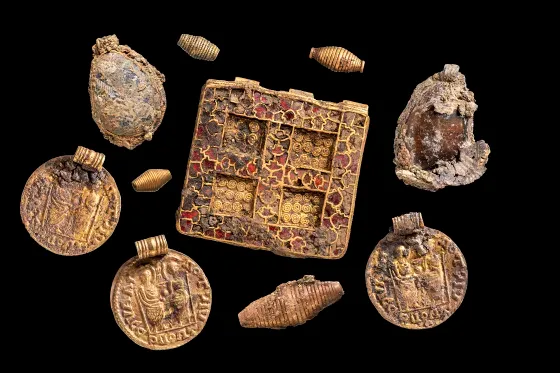Dig at U.K. housing site yields major 7th century treasures

Archaeologists said Tuesday that a 1,300-year-old gold and gemstone necklace discovered on the site of a new housing development marks the grave of a powerful woman who may have been an early Christian religious leader in Britain.
Experts believe the necklace, discovered alongside other items near Northampton in central England, is part of the most significant early mediaeval female burial ever discovered in the United Kingdom.
The woman is long gone; all that is left is some tooth enamel. However, scientists believe her long-buried treasure will shed new light on life in 7th century England, when Christianity was competing for people's allegiance with paganism.
According to Lyn Blackmore, a senior finds specialist at the Museum of London Archaeology, the items are "a definite statement of wealth as well as Christian faith."
"She was very religious, but was she a princess?" Was she religious? Was she something more than a nun — an abbess? … "We have no idea," Blackmore admitted.
The Harpole Treasure, named after the village where it was discovered about 60 miles northwest of London, was discovered in April by archaeologists working on a new housing development with property developer Vistry Group.
Levente-Bence Balázs, the site supervisor, noticed something glinting in the dirt on one of the final days of the 10-week dig. It turned out to be a rectangular gold pendant with a cross motif inlaid with garnets, the focal point of a necklace that also included pendants made from gold Roman coins and semiprecious stone ovals.
"These artefacts haven't seen daylight in over 1,300 years," said Balázs. "To be the first person to see it — it's simply indescribable."